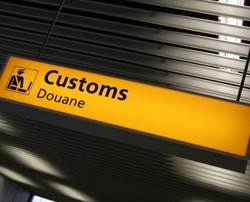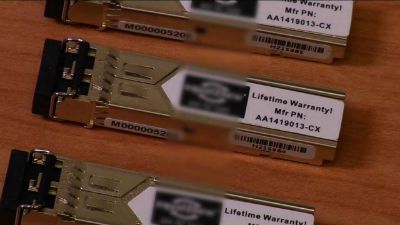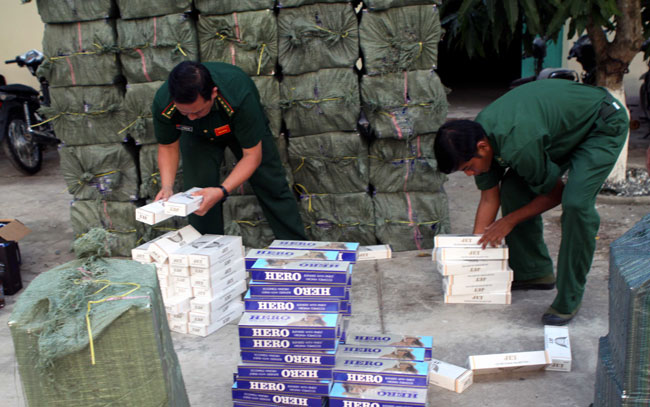
France seizes falsified drugs labelled as Chinese tea
Customs signCustoms officers in France have confiscated millions of fake aspirin, erectile dysfunction and diarrhoea drugs from China in what they claim is the largest recorded seizure of falsified medicines in the EU. Around 2.4m knock-off pharmaceutical products – concealed in two containers marked as containing Chinese tea – were seized at the port of Le Havre in France on February 27.
The haul included 601 boxes of medicines, including fake versions of Pfizer’s Viagra (sildenafil) and Eli Lilly’s Cialis (tadalafil), and was twice the size of the previous biggest seizure (once again in Le Havre) which netted 1.2m fake aspirin products in May 2013.
Lear MoreCity cracking down on illegal tobacco sales
A new tobacco retailers licensing program will add some teeth to existing state requirements and provide the City of Morgan Hill with more funds to conduct decoy operations to nab vendors who might sell cigarettes or other tobacco products to children, city staff said.
The council unanimously approved the first reading of an ordinance on the advice of the Morgan Hill Police Department. Capt. Jerry Neumayer said just before the council’s decision that the program would advance the council’s goals of “supporting youth and enhancing public safety priorities.”
Lear More
150 tobacco packs meant for illegal sale seized
(MENAFN – Muscat Daily) The Department of Inquiries and Criminal Investigations at the Seeb police station has arrested an Asian national for possessing a large quantity of smoking tobacco for sale illegally. An official said that the police station received a tip-off that a man was illegally selling various tobacco products in the Seeb market. ”The man was put under surveillance and arrested when he was driving away to sell the products. More than 150 packets of tobacco were recovered from him.
Lear More

Man faces 20 years in prison in counterfeit computer chip scheme
MILWAUKEE (WITI) — Thinking about buying any parts for your computer? FOX6′s Contact 6 says beware — those parts could be fake! “He would purchase the chips for about $2.00 a piece in China and sell them in the U.S. for several hundred dollars,” U.S. Postal Inspector Alex Sylvester said.
Ronald Graban, the mastermind in this scheme, realized he could make a very healthy profit. “He had inside information on exact serial numbers that Cisco and Nortel use. So, when he requested labels from China, they would put those exact numbers on there to try and hide they were counterfeit chips,” Sylvester said. Graban would then sell them to a third-party retailer. “It was reported to be a refurbished Cisco and Nortel product but in fact it wasn`t. It was a counterfeit product from China,” Sylvester said.
http://fox6now.com/2014/04/06/man-faces-20-years-in-prison-in-counterfeit-computer-chip-scheme/
Lear MoreTobacco smuggling Gibraltar border row
The difference in the price of tobacco is fuelling an illegal trade of smuggling from Gibraltar to Spain that appears to be increasing rapidly. Spanish police have attempted to crack down on the smugglers, leading to long traffic jams on the border and rising tensions between the two nations.
http://www.bbc.com/news/world-europe-26880182
Lear MoreTobacco manufacturers told, internal law won’t stop Bill C-10 By Donna Duric, Writer
Six Nations Band Council has no concrete plan to fight the impending Bill C-10. With Elected Chief Ava Hill at the helm of a community meeting on the impending Tackling Contraband Tobacco Act (Bill C-10) last week, she called on the community to help them come up with strategies to fight the bill as it continues to wind its way through parliament. The bill aims to amend the Criminal Code to make trafficking in “contraband” tobacco an offence punishable by a maximum of five years in prison. It has already passed second reading in the House of Commons. About 60 community members, including local tobacco manufacturers, attended the meeting at Polytech last Wednesday night. But before the public meeting got underway, moderator Sandy Porter asked the audience if they wanted the media (The Turtle Island News was the only media present) to leave before the strategy session got under way. No one in the audience agreed with the suggestion. Elected Chief Hill explained parliamentary processes, saying she expects the bill to pass through the Senate and become law before parliament breaks for the summer recess in late June.
Lear More

Illegally imported tobacco impounded
HCM CITY (VNS)— Over 15,800 packets of smuggled tobacco were seized on Tuesday in an operation by the HCM City Market Watch Department to prevent smuggled tobacco from being traded in the city. The city’s operation is part of an ongoing nationwide campaign against tobacco smugglers held between April 1 and June 30, which was launched by the Ministry of Industry and Trade’s Market Surveillance Agency on Tuesday. The move follows the Government’s directives on fighting cigarette smuggling to protect the domestic producers and local employees, and to ensure revenue for the State budget and social security. Typically, the Market Watch Team 3B, which checked tobacco trading in District 3′ s Ward 8, confiscated more than 1,800 packets of smuggled tobacco, whereas the Tan Phu Market Watch Team, which checked the trading in Tan Phu District’s Tay Thanh Ward, seized more than 6,000 packets of smuggled tobacco of different kinds.
http://vietnamnews.vn/society/253188/illegally-imported-tobacco-impounded.html
Lear More
Customs hauls in massive haul of illicit cigarettes and molasses tobacco
The Australian Customs and Border Protection Service (ACBPS) has seized 300,000 illicit cigarettes and 1,866 kilograms of illicit molasses tobacco in Melbourne. On Monday 24 March, ACBPS officers at the Melbourne Container Examination Facility referred the shipment for further examination, when an x-ray of its contents revealed anomalies. During the examination, approximately 100 cardboard boxes containing illicit cigarettes and tobacco were identified amongst boxes of household goods including blankets, plasticware and ornaments. ACBPS national manager cargo operations Jagtej Singh said the potential revenue evasion of this seizure is estimated to be over one million dollars. “Tobacco is considered illicit or illegal if it is not declared at the border and does not have the appropriate duty paid,” Mr Singh said. “Customs and Border Protection takes the importation of illicit cigarettes and tobacco very seriously as it denies the Commonwealth of legitimate revenue in an attempt to evade tax. “We are committed to combating tobacco smuggling through whole-of-agency activity in collaboration with government, industry and international partners.” During 2012-13, Customs and Border Protection made 76 seizures of smuggled tobacco products in sea cargo, consisting of 183 tonnes of tobacco and 200 million cigarettes, representing a potential duty evasion of $151 million. The maximum penalty for tobacco smuggling is a fine of up to five times the amount of duty evaded or 10 years gaol time.
Lear MoreLargest illegal tobacco haul in Lewisham
A Lewisham retailer has been found with over £100,000 worth of illegal tobacco – believed to be the biggest find by Trading Standards in the country.
On Saturday 22 March, a Lee High Road retailer was searched by Lewisham Council’s Trading Standards officers finding 600kg of illegal Chinese hand rolling tobacco, with a potential street value of over £100,000. The manager of the shop stated the premises did not sell or stock cigarettes. However, officers from Lewisham Council, with the help of a tobacco detection dog called Jack, sniffed out the substantial find in the shop and store room. The owner of the shop is now under investigation. In the same week, officers also seized 10,000 Chinese cigarettes and counterfeit hand rolling tobacco in Deptford, and 15,000 Russian cigarettes in Lee Green. Trading Standards are also investigating this further. Lewisham Council, the police and HM Customs, carry out targeted raids on premises considered to be selling illegal tobacco. Any proprietor found to stock or sell these will be liable to prosecution. Illegal tobacco can be reported anonymously by calling the Citizens Advice Consumer Service on 0845 404 0506.
Lear More
Africa loses $60bn annually through illicit financial flows – Mbeki
A former South African President, Mr Thabo Mbeki, on Sunday in Abuja said African countries lose between 50 billion dollars and 60 billion dollars annually through illicit financial flows (IFF). Mbeki said this while presenting the Progress Report of the High-Level Panel on IFF at the ongoing 7th AU-ECA Conference of Ministers of Economy and Finance. Mbeki was the Chairman of the panel set up by the Economic Commission for Africa (ECA) in 2012 to look into the nature of illicit funds in the continent. He said the huge sums did not include capital flight, saying it came from proceeds of commercial transactions through multinational companies, criminal activities and corruption.
The former South African president lamented that the monies which would have been used to provide infrastructure and social amenities for the poor African population were transferred to other countries. “Consequently, this left the continent in poverty,’’ he added. Mbeki said the situation was occasioned by the weakened tax regime of some countries in the continent, adding that proper mechanism needed to be put in place to check the trend. “In terms of the phenomenon of mis-pricing, the estimates are between 50 and 60 billion dollars which the continent loses as illicit financial flows, with capital flight not included.
Lear More


